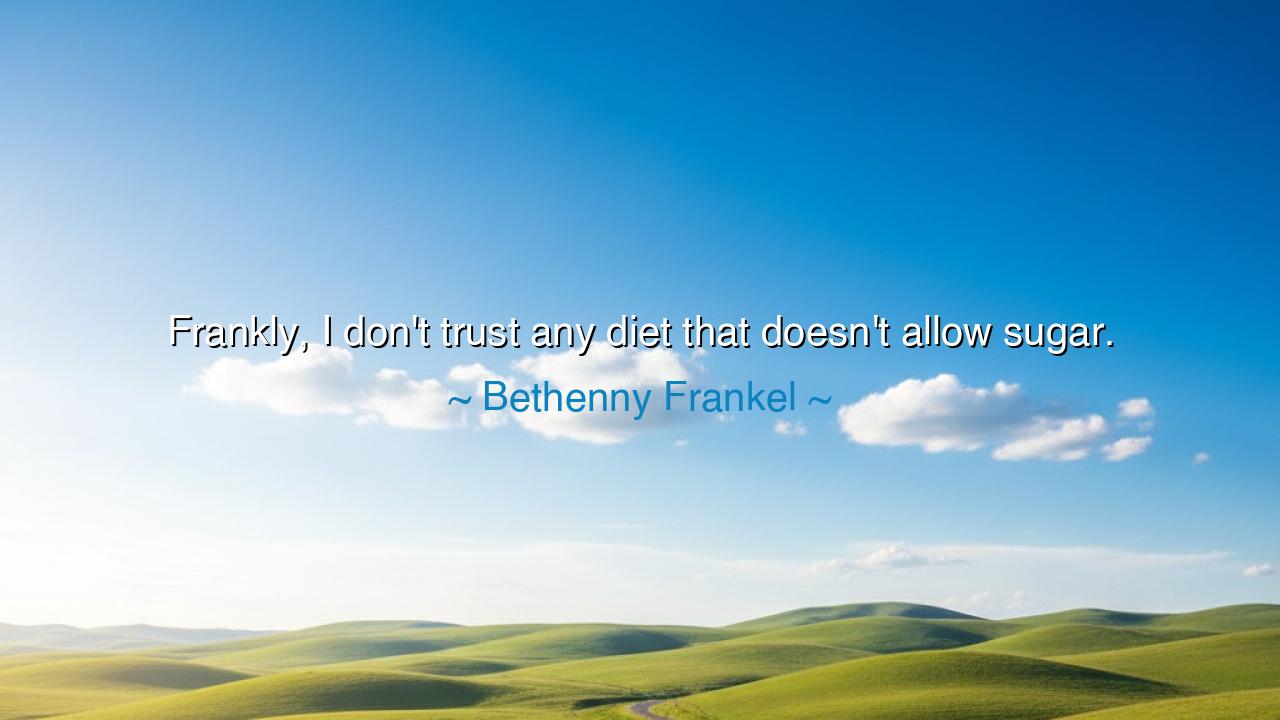
Frankly, I don't trust any diet that doesn't allow sugar.






In the words of Bethenny Frankel, “Frankly, I don’t trust any diet that doesn’t allow sugar,” there lies a wisdom that goes beyond the surface of food and sweetness. Her words speak not only of diet, but of balance, of human nature, and of the folly of extremes. In this statement, simple yet profound, we hear the echo of ancient truth — that the body and soul both hunger, and that to deny one entirely is to harm the other. Frankel speaks as the philosophers once did — not against discipline, but against the cold perfectionism that drains joy from the art of living.
To say, “I don’t trust any diet that doesn’t allow sugar,” is to affirm the eternal principle that life requires sweetness. For what is sugar but the symbol of pleasure, of celebration, of the small joys that make existence worth enduring? In ancient times, when honey was the rarest of treasures, it was offered to the gods as an emblem of divine favor. The Greeks believed that the gods fed on nectar and ambrosia — sweet sustenance that kept them immortal. Thus, sweetness itself became a metaphor for grace, for the richness that nourishes not only the body but the heart. Frankel’s words, though modern, draw from this same understanding: that health divorced from joy becomes another form of suffering, and that any path which denies life’s natural delights is a path that leads not to wholeness, but to withering.
Throughout the ages, the wise have warned against the danger of extremes. The philosopher Aristotle spoke of the “golden mean” — the balance between indulgence and deprivation. A man who eats without restraint destroys his body, but one who never allows himself pleasure destroys his spirit. So too does Frankel, in her own way, uphold this timeless truth: that the middle way is the truest path to harmony. To eliminate sweetness entirely from life, whether in food or in feeling, is to forget that joy itself is a kind of nourishment. A diet without sugar may keep the body lean, but it risks leaving the soul starved.
Consider the story of Marcus Aurelius, the philosopher-emperor of Rome. Known for his discipline and temperance, he nonetheless allowed himself moments of quiet pleasure — a cup of wine after battle, the company of his friends, the laughter of his children. He understood, as Frankel does, that pleasure is not the enemy of virtue, but its companion when held in balance. A man who cannot smile, who cannot savor, is not wise — he is merely weary. The same is true of the one who forbids all sweetness in pursuit of purity: he forgets that life itself, though fleeting and imperfect, is meant to be enjoyed.
When Frankel says she doesn’t trust such a diet, her skepticism is not rebellion — it is wisdom born of experience. She distrusts not the abstinence itself, but the false promise that total denial leads to freedom. The ancients, too, distrusted those who claimed to conquer their nature entirely. The Stoics sought not to suppress desire, but to understand it; not to reject pleasure, but to master it. For mastery is not destruction, but harmony — the ability to indulge wisely, to enjoy without being enslaved. In this light, her “sugar” becomes a symbol of the spirit’s need for lightness and warmth amidst the trials of discipline.
There is a quiet defiance in her words — a reminder that joy is sacred. In every great philosophy, from the teachings of Confucius to the meditations of Seneca, there runs the same current: the understanding that true health — of body, mind, and soul — is found only when discipline walks hand in hand with delight. The one who lives by rigid rules without compassion soon finds himself imprisoned by them. The one who allows himself no sweetness may appear virtuous, but his virtue is hollow. To trust in moderation, as Frankel does, is to trust in the wisdom of nature — for the earth herself gives both bitter herbs and sweet fruits, each serving a purpose in the great design.
Let this be the lesson passed down: Beware the path that forbids all joy, for it leads to imbalance. A life too strict becomes brittle; a heart too denied becomes cold. Eat with mindfulness, but also with gratitude. Allow yourself the occasional sweetness, not as weakness, but as an act of reverence for life itself. For the one who can enjoy a single morsel of sugar with full awareness has greater mastery than the one who denies it in fear.
Thus, the wisdom of Bethenny Frankel is not a call to indulgence, but to wholeness. She reminds us that a truly healthy life must be sustainable, and sustainability is born not from denial, but from understanding. The ancients would have recognized her truth: that the human being is not nourished by food alone, but by pleasure, gratitude, and moderation. To live well is to live sweetly — not in excess, but in harmony — and to remember always that even the smallest sweetness can keep the flame of joy alive in the long journey of life.






AAdministratorAdministrator
Welcome, honored guests. Please leave a comment, we will respond soon